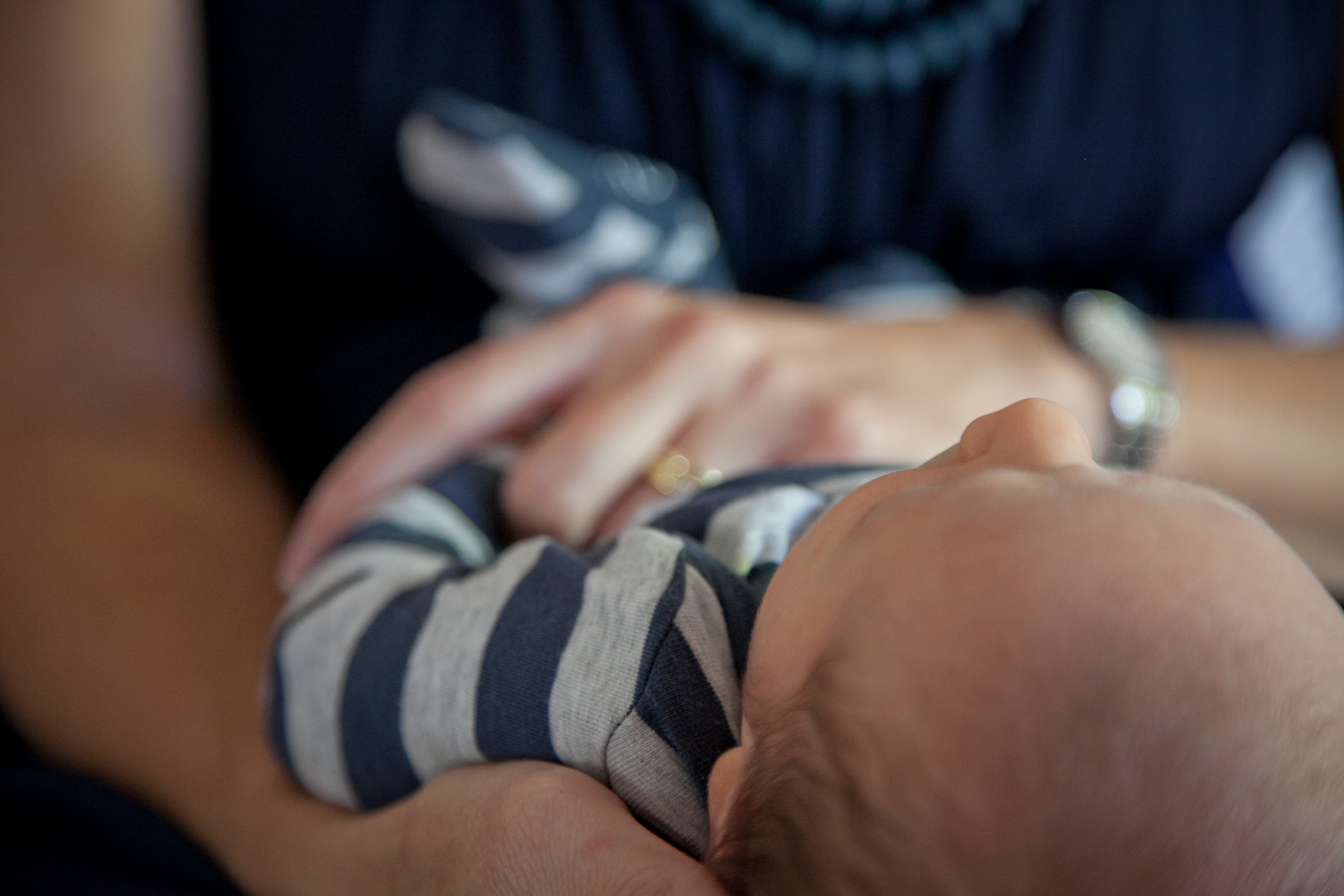When my daughter was born, she cried a lot. Like, a lot. I remember preparing to leave the hospital thinking there was something wrong with me as a mom, because I couldn’t seem to comfort my new baby, no matter what I did. Everyone else was leaving with these sweet, sleeping little babies, and I was leaving with a ticking time bomb that turned into a raging, purple faced ball of fury every few hours. I felt like something was wrong, but when I asked the pediatrician I was always blown off as a new mom who didn’t know that “all babies cry”. I asked if she could be in pain from something I had eaten, and I was told that babies can’t react to foods through breastmilk. Knowing what I know now, there are plenty of moms with kids who have food allergies that will tell you that yes, absolutely, babies can react to food allergy triggers through their mom’s breastmilk. So, what does a food allergy reaction look like for a baby that’s still breastfeeding?
- Some of the big symptoms to look for include:
- Diarrhea blow out diapers
- Vomiting or lots of spit up
- Blood in stool (sometimes visible, sometimes not visible except with an occult test)
- Mucousy stool (clear strings that look like snot mixed in with the poop)
- Inconsolable crying*
- Gas – especially really stinky or really painful gas
- Really bad diaper rash that will not go away – this will sometimes look like tons of blisters and sometimes will look like raw open wounds.
*We are talking about gut wrenching, screaming in pain type of crying. These are the babies screaming for hours on end, crying all night long, arching their backs in pain, writhing on the floor or couch for toddlers, or inconsolable. Nothing you do helps this baby calm down – they don’t want to be touched and they also don’t want to be put down at the same time. It goes on for hours and all you can think is…this can’t be normal. You may have been told it’s normal for babies to cry, it’s normal for gas, spit up, etc. This is true, but if you are seeing reactions of this magnitude, I’m here to tell you IT’S NOT NORMAL. And, even better news, you are not alone.
What is the timing for breastmilk reactions?
Timing for reactions is going to be different for each person. In general, the timeline for your baby to react should be 1-4 hours after nursing. Most babies react between 2-3 hours after eating. The good news for this is that once you figure out your baby’s reaction pattern while they are nursing, it should be similar when they start solid foods if they react to those.
Keep in mind that it can take 4-6 hours for food that you eat to make its way into your breastmilk, so when your child starts reacting, you need to think back 4-12 hours before to figure out what you might have eaten. This is where keeping a solid food journal comes in really handy.
I used to try to time it for my daughter and think back to 2-3 meals before the reaction occurred. So, if I had eggs for breakfast, pork and apples for lunch, and beef and broccoli for dinner, and she started having crazy painful reflux at 6pm, I would start with eggs, pork, and apples as likely trigger foods. Then, I would try those foods again after a few days, but this time I would try them separately. So, one day I would have eggs and watch for a reaction. If that went well, then I would try apples the next day and watch for a reaction.
This can be a time consuming process, and it can be really really hard to be patient and watch for reactions to occur. But, FPIES life is not a sprint, it’s definitely a marathon.
What symptoms should I look for?
- Diarrhea blow out diapers
- Vomiting or lots of spit up
- Blood in stool (sometimes visible, sometimes not visible except with an occult test)
- Mucousy stool (clear strings that look like snot mixed in with the poop)
- Inconsolable crying*
- Gas – especially really stinky or really painful gas
- Really bad diaper rash that will not go away – this will sometimes look like tons of blisters and sometimes will look like raw open wounds.
* We are talking about gut wrenching, screaming in pain type of crying. These are the babies screaming for hours on end, crying all night long, arching their backs in pain, writhing on the floor or couch for toddlers, or inconsolable. Nothing you do helps this baby calm down – they don’t want to be touched and they also don’t want to be put down at the same time. It goes on for hours and all you can think is…this can’t be normal. You may have been told it’s normal for babies to cry, it’s normal for gas, spit up, etc. This is true, but if you are seeing reactions of this magnitude, I’m here to tell you IT’S NOT NORMAL. And, even better news, you are not alone.
My usual disclaimer here: All of the symptoms above can occur with a number of different health conditions or disorders. You definitely want to get a doctor involved if you are seeing symptoms like this, so they can rule out health conditions that might be the underlying cause of these symptoms. There could be a blockage somewhere, something structurally wrong inside your child, etc. and that stuff obviously needs to be ruled out. However, if you have ruled all of that out and are still having issues that coincide with breastfeeding, it’s likely that there could be an allergy or an intolerance to something in your diet.
If my child fails a solid food while I’m breastfeeding can I still eat that food?
Good question!
It depends. (you knew I was going to say that, didn’t you?)
We had to tread very carefully when we started trialing solid food for my daughter. There were a few early foods that she failed when we gave them to her directly, like sweet potatoes and rice. We cut those out and just went back to breastfeeding and things got better, but I still felt like something was making her sick. There was so much crying and gas, her diapers didn’t really get better, and her reflux was crazy out of control. A friend with FPIES kids recommended that I try cutting out sweet potatoes and rice from my own diet, and within a few days we had a totally different baby. It was crazy.
We realized after a few more of these reactions that once she failed a food on her own, she was no longer able to tolerate the trace amounts of that food that was passing through my milk. This doesn’t happen with every child, but the babies that are super sensitive seem to have more of an issue with this.
This may be something to take into consideration if you are on an elimination diet especially, because there may be a food that you need to keep in your diet for calories or nutrition that you can’t afford to lose. If that’s the case and your child has a history of failing foods and then losing those foods through breastmilk, I would use caution.
Don’t beat yourself up if you can’t figure it out right away – identifying triggers while breastfeeding is a lot harder than identifying triggers when you start feeding solid foods. There are just more things to factor in! You have to think about when your baby last ate, and what you ate before that and then try to guess from there what might be the cause.
It’s even harder if you are nursing on demand, because your baby might eat for ten minutes, then after 45 minutes be hungry again. If you’ve eaten something that’s a trigger for them, they may have one small reaction 2 hours after that first nursing session, followed by another reaction 45 minutes later (which would be 2 hours from that second nursing session).
This can create an almost constant pattern of reactions, because babies who don’t feel good want to nurse more for comfort, which causes them to be sick a few hours later, which makes them want to nurse again. If you are seeing lots of blowout diapers, or mucousy poop all the time, lots of screaming or lots of spit up, then there may very well be something in your diet that’s a trigger for your baby.
How long does it take for that food to get out of my milk?
This can really vary depending on the type of food. For a minor fail, I found that usually after 2-3 days I wasn’t seeing any new or worsening symptoms for my daughter. It still took a few more days past that for full recovery as her body got rid of the trigger, but at that point it wasn’t like she was getting more of the food protein from my milk every few hours.
For some foods, it can take a while for those proteins to work their way out of your body. Dairy and wheat are the two most famous foods for this. It can take up to 3 full weeks for your body to fully get rid of dairy and wheat. The same is true for your baby. You will most likely see a lot of improvement after a few days to a week of removing the food, but for these two it can take almost a month or even a little longer to totally detox from it.
Soy is the same way and can take several weeks to clear out of your system. Often, when a baby is allergic to dairy, they will have a soy allergy as well because the protein structure of dairy and soy are really similar. Because they both take several weeks to get out of your system, it’s usually recommended for women to cut out both dairy and soy at the same time. You can cut just one or the other, but if you pick the wrong one and end up having to eliminate the other, it takes another 2-3 weeks where you have to start over from scratch.
Unfortunately, cutting both out at once is a lot harder than just cutting one or the other, because a lot of dairy free products have soy in them. It’s definitely possible though!
So, what do you do when you have a baby that’s reacting to your breastmilk?
If you are in this spot, there are several things to try. I’ve written a full post about it here with some different options to try. Believe it or not, it’s not totally hopeless when you find yourself in this situation. It may very well feel desperate, and you might get to the point where you are willing to try anything to help your child feel better and stop the endless screaming. That’s actually a good thing, because it will probably take some tenacity and mental persistence to push through the fails to the other side. Food allergy moms are made of the toughest cloth that exists, and that’s because they have to fight and push through what feels almost hopeless sometimes to help their child. Good luck, and keep fighting!

